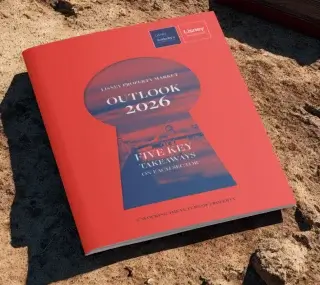read also
 Lisney Property Market Outlook: Irish Property Market Poised for Steady Growth in 2026
Lisney Property Market Outlook: Irish Property Market Poised for Steady Growth in 2026
 Inflation in Romania Slows to 9.6% but Remains Above Forecast
Inflation in Romania Slows to 9.6% but Remains Above Forecast
 Riots in Mexico Disrupt Air Links to Resort Destinations
Riots in Mexico Disrupt Air Links to Resort Destinations
 UK House Prices Stabilise After 2025 Slowdown
UK House Prices Stabilise After 2025 Slowdown
 Israel Housing Market Eyes a Reset in 2026
Israel Housing Market Eyes a Reset in 2026
 Real Estate Investment Declines in Southeast Europe in 2025
Real Estate Investment Declines in Southeast Europe in 2025
Buying Real Estate in Bali: Hidden Pitfalls and Risks

Buying an apartment, a hotel unit, a villa, or a house on the paradise island of Bali seems tempting, but this dream has a downside. Experts warn that despite the region’s tourist appeal, investors may encounter several problems and hidden risks. Below, we take a detailed look at the main disadvantages of purchasing real estate in Bali – from market oversaturation and construction issues to legal restrictions and security concerns.
Real Estate Market Oversaturation
The rapid growth of construction in Bali in recent years has led to market oversaturation. According to the platform AirDNA, from Q1 2023 to Q1 2024, the number of available rental villas on the island increased by 27%, while bookings grew by only 12%.
In other words, the supply of housing is growing faster than tourist demand. This leads to heightened competition among landlords: 2024 has become one of the most challenging years for property rentals – villa owners are facing a record number of competitors, causing actual returns to be lower than expected.
Occupancy rates are declining: The average annual occupancy rate for short-term rentals is around 66%, peaking at 89% only during the high season.
According to experts, by mid-2024, Bali had over 33,000 active short-term rental listings (mainly villas and apartments) – 24.6% more than the previous year. Additionally, the largest long-term rental portal, Rumah123, lists about 85,000 rental offers in Bali, and this number continues to grow.
The oversupply is forcing property owners to lower prices, especially in the budget segment, where rental rates have started to slightly decline. Due to local real estate overproduction, price corrections are also being recorded. For example, in the popular areas of Seseh and Cemagi, after a surge in prices in 2022–2023, there was a rollback: by January 2024, land rental prices decreased by 16–28% from peak levels. Experts warn that such mini-"bubbles" may burst in oversaturated areas.
Future market predictions vary. As long as the supply of housing outpaces tourist demand, the market is expected to stagnate in terms of revenue in the short term. According to the head of a property management company, rental income may be lower than expected due to excess competition. Overall, market oversaturation is a significant risk factor, limiting price growth and reducing the investment attractiveness of some properties.
Green Zones and Construction Issues
One of Bali’s major problems is violations of building regulations, particularly in so-called "green zones." A green zone (Zona Hijau) is a category of land designated for agriculture or conservation, where construction is strictly prohibited. These areas – rice fields, forests, parks – are protected by law to maintain ecological balance and traditional ways of life. The only structures that may receive approval in green zones are those directly related to agriculture or eco-tourism (such as small farming sheds or eco-lodges). Constructing residential homes or villas in such places without special permission is illegal and carries severe consequences, including demolition.
Despite these prohibitions, illegal construction in green zones has increased. Local authorities admit that many villas and commercial properties have been built in violation of regulations on agricultural land. Developers, seeking to capitalize on picturesque views of rice terraces or coastlines, often take risks and build in prohibited areas, sometimes securing support from corrupt officials. In 2021, the governor of Bali publicly acknowledged the scale of the problem and promised decisive measures, including scheduled raids and demolition of buildings violating the "no-build" regime in green and sacred zones.
As a response, in September 2024, the Indonesian government announced plans to halt new permits for hotels, villas, and nightclubs in Bali's most congested areas for 5–10 years. The goal is to curb chaotic construction, preserve agricultural land, and prevent further environmental degradation.

Bali authorities are tightening measures against illegal construction: officials are shutting down properties violating regulations (in the photo: police tape with "No Entry" at a site where violations were found).
Already, there are precedents for real penalties against unscrupulous developers. In 2024, in the Ubud area, a major residential complex, PARQ Ubud, was shut down due to multiple violations – it lacked proper permits and did not comply with environmental regulations. Authorities initially gave the developer time to correct the documentation, but after failing to do so, they sealed off the property and ceased its operations.
This case became widely discussed because the complex, popularly known as the "Russian Village," had attracted investments from many foreigners, who now effectively had nothing left. Moreover, criminal cases are being filed against owners of such illegal projects: the director of PARQ was arrested for unlawful land use changes and other violations.
Another example is a controversial hotel project in Jimbaran, which was being built in a coastal green zone: after protests from the local community and intervention from senators, the construction was halted, and the authorities are now threatening to completely shut down the project.
For real estate buyers, a developer’s zoning violations pose a massive risk. If a property is built in a green zone without approval, it will have no legal status: it cannot be officially registered or connected to utilities on legal grounds. A buyer may not even be aware of the problem until it’s too late. In the worst-case scenario, authorities may order the demolition of an illegally constructed property, causing the investor to suffer massive financial losses.
Experts strongly advise thoroughly verifying the land’s zoning status before purchasing – requesting a zoning plan (territorial designation plan) and ensuring that the plot is not classified as ruang terbuka hijau (green open spaces). Unfortunately, unscrupulous developers sometimes deliberately mislead foreign buyers, promising to "settle matters" or concealing the land’s actual designation. Ultimately, the buyer is the most vulnerable party: legally, they have little protection since the law prioritizes the preservation of green zones. As villa owner Mellonie Francis notes, there is currently "uncontrolled development of protected areas," exacerbating Bali’s environmental problems. She and other industry professionals are calling on the authorities to enforce strict regulations – including the demolition of illegal constructions to preserve Bali’s heritage.
Thus, purchasing property from an unreliable developer can lead to a total loss of investment. It is essential to ensure that a property is built in a permitted area and has all necessary Indonesian building permits (IMB/PBG). The lack of such control is one of the biggest risks for investors in Bali.
Restricted Ownership for Foreigners
Even if the property itself is legally compliant, foreign buyers must overcome legal hurdles. Direct foreign land ownership in Bali is prohibited by Indonesian law.
According to the Basic Agrarian Law (UU No.5 1960) and the country’s constitution, full land ownership rights (Hak Milik, equivalent to freehold) may only belong to Indonesian citizens. Any transactions leading to direct or indirect land ownership by a foreigner are considered invalid. This means that a foreign investor cannot simply "buy a villa" in the usual sense – at least not permanently register land in their own name.
To bypass these restrictions, three main schemes are commonly used, each with its drawbacks:
Leasehold (long-term lease). Essentially, a foreigner is sold not the land itself but the right to use it for a fixed term. The standard leasehold period in Bali is 25–30 years, with an option to extend for another 20–25 years by agreement. Such lease agreements can be registered as Hak Pakai (Right to Use) or remain as private contracts. Long-term lease is a legal option recognized in Indonesian law and is considered relatively safe. However, it has its downsides: the lease has a fixed term, after which rights revert to the landowner. Essentially, after 25–30 years, you risk losing the property unless you successfully negotiate a renewal on new terms. Additionally, leasehold rights are not registered in the national land registry as ownership and cannot be used as collateral for a bank loan. This offers reduced rights compared to full ownership.
Hak Pakai (Right to Use) on residential properties. Indonesian law has relaxed slightly in recent years: foreigners holding a residence permit (such as KITAS/KITAP) are now allowed to obtain Hak Pakai rights to own a property for personal residence. Essentially, this is a compromise solution: a foreigner can buy a house or apartment and obtain a special Hak Pakai certificate in their name. This title grants ownership rights for up to 30 years, with an option to extend for an additional 20 years, followed by a possible further renewal. In total, this can provide a right to the property for 50+ years, which is close to lifelong ownership. A key condition is that this can only be done for one residential property intended for personal living (not for commercial rental) and must meet specific criteria.
For instance, in Bali, a foreigner can obtain Hak Pakai only for a property valued at a minimum of 5 billion IDR (≈$325,000), and the land must not exceed 2,000 square meters. Furthermore, the plot must already have a completed house – a foreigner cannot purchase an empty plot of land under this scheme. This regulation is intended to prevent speculative land purchases. Essentially, Hak Pakai allows foreigners to use the property almost as an owner, but it is not absolute ownership: the state retains control, and the property can only be sold to another foreigner (with a Hak Pakai transfer) or to an Indonesian citizen (reverting the title to Hak Milik). The process of obtaining Hak Pakai is complex, requiring government approvals and administrative fees, but it remains the most legal way for foreigners to own a home in Bali without intermediaries.
Nominee Arrangement (local nominee ownership). This is an unofficial and highly risky scheme. In this case, a foreigner buys a property in the name of a local Indonesian citizen, signing a set of private agreements (power of attorney, loan agreements, sale rights, etc.) that supposedly guarantee the foreigner's control over the property. Such schemes were popular in the past, but today, they are increasingly being ruled illegal. The Indonesian Supreme Court has explicitly stated that land sale transactions using nominee ownership lack legal standing.
A well-known case illustrates this risk: a foreign investor purchased land through a local nominee, but that nominee later resold the land to third parties without the investor’s consent. When the case went to court, the foreigner’s claim was dismissed – the court ruled that the nominee agreement was invalid, meaning the foreigner had no legal rights to reclaim the land. In the end, the nominee escaped liability, while the real buyer lost both money and land. This case serves as a stark warning to those attempting to bypass the law: Indonesian courts strictly enforce the ban on direct foreign land ownership, and in any dispute, the foreign buyer is likely to lose.
Apart from these options, foreigners may also acquire land through an Indonesian company (PT PMA), which is granted a building rights title (Hak Guna Bangunan) for commercial projects. This allows the company to hold land for 30 years, extendable up to 80 years, but the company must be operational. This method is complex and expensive, making sense only for significant investments and business operations in Indonesia.
Buying Hotel Units (Hotel Condominiums, Condotels)
Another popular investment option is purchasing a hotel unit or a share in a hotel complex. This type of investment is widely advertised as a stable income opportunity, but in practice, it also comes with significant risks.
Legal ownership remains an issue.
Risks of Investing in Condo-Hotels and Hotel Units in Bali
Lack of full ownership rights. Similar to apartments, a foreigner cannot own a hotel unit under the Hak Milik title. The only legal option is leasehold agreements (typically 25–30 years), after which the unit reverts to the hotel owner.
Dependence on the management company. In most cases, investors do not have the right to manage the property themselves. All operations, including rental management, maintenance, and marketing, are controlled by the hotel’s management company. If the company turns out to be ineffective or dishonest, the investor has little control over the situation.
High fees and hidden charges. Many projects have undisclosed fees that reduce actual earnings. Some developments require annual service charges of up to $3,000–$5,000 for property maintenance.
Unrealistic return-on-investment (ROI) expectations. Developers often advertise rental yields of 12–15% per year, but in reality, the net return is often much lower. In practice, the payback period for a hotel unit in Bali is at least 10–12 years under optimal conditions, and even longer during economic downturns.
Risk of project bankruptcy and construction delays. Some hotel projects face financial difficulties and remain unfinished, even after part of the units have been sold. In 2023 alone, Bali saw over 20 abandoned hotel projects where investors lost their money.
Resale challenges. Most investors are not interested in buying properties with a limited lease period, making it difficult to resell units at a good price.
Buying apartments or hotel rooms in Bali may seem like a profitable investment, but in reality, these assets carry high risks. Apartments are often in a legal gray zone—if they are located outside specially designated zones, their sales transactions may be illegal. Condo-hotel investments are vulnerable to risks such as hotel operator bankruptcy, hidden costs, exaggerated ROI projections, and lack of ownership rights.
Examples of Abandoned Projects and Their Causes
Bedugul Taman Rekreasi Hotel ("Ghost Palace") – A grand resort project in the mountains of Bedugul, which began construction in the 1990s but was never completed. The development was planned as a luxury hotel overlooking Lake Buyan, but was abandoned due to financial difficulties and legal issues. According to sources, the project was financed by Tommy Suharto (son of Indonesia’s former president), and after his arrest in 2002, the development was frozen. As a result, the building remains unfinished, with invested funds effectively lost, and the site has become an urban legend known as the "Ghost Palace."
Nusa Dua Circle Project (Avani Nusa Dua) – A large-scale development in the Jimbaran area (southern Bali), including a hotel under the Avani brand, a condo-hotel, and apartments. Launched in 2013 in partnership with the international operator Minor Hotel Group, the construction budget was estimated at nearly 2 trillion IDR.
The complex was scheduled to be completed by late 2014, and many units were sold to investors while still in the planning phase. However, the project stalled – as reported, due to issues with building permits (missing IMB approval) and land use violations. Authorities refused to issue construction permits until the project complied with zoning regulations (the land was originally designated for commercial use, not a hotel). Consequently, construction was halted, and investors who had purchased condo-hotel units suffered losses—many were left without the promised properties.
Regulatory violations and government intervention. This is a common reason for project suspensions. For example, in 2025, a major scandal erupted in Bali over the construction of a luxury hotel in Jimbaran: it was revealed that the building was being developed on a protected coastal cliff and exceeded the permitted height (more than seven stories). Local senator Niluh Jelantik drew public attention to the issue, and authorities threatened to shut down the project. Inspections confirmed the height violation (26 meters instead of the legal limit of 15 meters), and officials demanded that excess floors be removed or the entire building demolished. A similar precedent occurred in 2005 when a hotel in Seminyak was forced to remove its upper floors for exceeding height restrictions.
Environmental and structural risks. In May 2024, authorities halted construction of a luxury cliffside residential complex in Uluwatu after part of the limestone cliff collapsed onto Pemutih Beach. Investigations revealed that the developer (Mirah Development Group) had undertaken large-scale excavation work on the cliff without proper environmental permits. The collapse triggered a wave of criticism—environmentalists labeled the project as unsustainable, and Indonesia’s Minister of Tourism, Sandiaga Uno, announced that unauthorized hill-cutting practices must be stopped. Until a full investigation is completed, construction remains suspended, and investors risk losing their funds due to forced project cancellation and potential penalties.
Reports indicate that Bali has many abandoned developments—ranging from private villas to large hotels. Expats and locals note a "scattered landscape" of unfinished buildings that ruin the scenery and provide no practical use. The main reasons are investor miscalculations, financial crises, land disputes, or missing permits. In many cases, inadequate due diligence and failure to comply with local laws lead to project shutdowns, leaving investments stranded. Therefore, investing in Bali’s property market carries the risk of project suspension unless all legal and regulatory factors are carefully considered.
Investor Losses in Suspended Projects
Each of the cases mentioned above resulted in significant financial losses. In the case of the “Ghost Palace” in Bedugul, investments amounted to millions of dollars, which were permanently “frozen” in the unfinished hotel. The Nusa Dua Circle project, according to media reports, attracted funding from dozens of investors (units were sold for as much as 1.3 billion IDR each), and all of these investments are now at risk due to the construction halt. The total financial losses depend on whether the project will be revived or sold to another developer, but at this stage, investors have neither received their properties nor generated any income.
In cases where illegal constructions have been demolished or forced to undergo reconstruction (such as the Seminyak hotel in 2005), project owners also suffered direct financial losses due to mandatory alterations or property forfeiture. If a project is fully abandoned, the land and unfinished buildings lose significant value, making it nearly impossible for investors to recover their capital.
Overall, the restrictions on foreign ownership in Bali are considerable. When purchasing real estate, you do not become the full legal owner of the land unless you go through the lengthy and complex process of obtaining Indonesian citizenship. Investors must be prepared for either long-term leasehold agreements or the limitations of the Hak Pakai title. In any case, hiring experienced lawyers to handle transactions, registering all agreements with land authorities, and avoiding semi-legal ownership schemes are crucial. The risk of losing property due to legal violations is very real: the government has the power to annul improper transactions, and an unscrupulous local partner could take advantage of the weak legal protection afforded to foreigners. This is why legal restrictions are one of the biggest “cons” for those wishing to buy property in Bali—the process is complicated, and the guarantees are less secure than in countries with more transparent land ownership systems.
Safety and Fraud Risks
While overall security in Bali is relatively high, there are specific risks that property buyers should consider. Indonesia has a very low rate of violent crime—intentional homicide rates stand at just 0.4 per 100,000 residents (one of the lowest in the world). Bali itself is considered one of the safest regions in the country according to most crime statistics. The political environment is stable, and there are no ethnic conflicts on the island. Tourist areas are patrolled by police and traditional Balinese security forces (pecalang), especially during major events. Many expats report feeling safer in Bali than in many Western cities. For example, the Australian government classifies Bali as a standard travel destination with no heightened security concerns.
However, it would be a mistake to feel completely carefree. The most common crimes affecting foreigners include pickpocketing, scooter theft, and rental scams. In crowded tourist areas like Kuta and Seminyak, there are frequent reports of thieves snatching bags or phones from unsuspecting visitors. Rental villas are sometimes targeted by burglars if owners neglect security measures. Balinese police frequently report arrests related to such crimes, but many minor offenses remain unresolved, especially petty thefts. Violent crimes against foreigners are rare, but there have been occasional home invasions targeting expat residences, particularly in more remote areas. In 2023, there were multiple reports of villa robberies involving knives, which caused alarm on social media. That said, such incidents are exceptions, whereas petty crimes occur much more frequently.
Security experts advise maintaining vigilance: using safes, not leaving valuables unattended, and avoiding deserted areas at night—just as you would anywhere else in the world.
Real Estate Fraud in Bali
With the investment boom in Bali’s property market, there has been an increase in scams targeting foreign buyers and renters. The most common fraud schemes include:
Selling non-existent properties. Scammers create attractive online listings for villas or land at discounted prices, often using stolen photos from legitimate properties. Once they receive a deposit, they disappear. Thousands of people have fallen victim to such "phantom villa" scams in recent years.
Fake agents and multiple sales fraud. It is not uncommon for fraudulent "real estate agents" to pose as authorized sellers and collect deposits from multiple buyers for the same property. There have been cases where a single plot of land was "sold" to several foreigners simultaneously, and the scammer vanished before legal action could be taken. Always verify an agent’s license and the property’s ownership records to avoid falling for such scams.
Forged documents and land mafia operations. Indonesia has a well-known issue with "Mafia Tanah"—organized groups that forge land certificates. Foreigners often struggle to detect these forgeries, and there have been cases where buyers only discovered that their ownership certificate was fake after the real landowner surfaced. Legal disputes in such cases are complex and can drag on for years.
Rental fraud schemes. In addition to sales scams, rental fraud is rampant: scammers rent out villas they don’t own or abandoned properties. Victims send money for long-term rental agreements, only to arrive in Bali and discover that the address doesn’t exist or is already occupied.
“Family disputes” and extortion schemes. Some foreigners who purchase land through a local nominee find themselves facing extortion from the "owner" or their relatives. The nominee may suddenly demand additional payments, threatening to seize the property, knowing that the foreign buyer has little legal recourse.
The rise in fraud has been so significant that local media has reported an "epidemic" of real estate scams in Bali, with both tourists and locals falling victim.
Bali remains an attractive place to live and invest, but investors must carefully weigh the risks. A saturated market makes it difficult to achieve quick returns from rentals, and property prices may stagnate. Zoning violations and illegal constructions can lead to financial losses if dealing with unscrupulous developers. Legal restrictions prevent foreigners from full ownership, adding complications and extra costs. Lastly, security factors necessitate vigilance to avoid falling victim to fraud or corruption. A well-informed and cautious approach is the best strategy to enjoy the tropical paradise without unpleasant surprises.


